The concept of sustainable and ethical travel is popular in recent years since it is proved that travel does more harm than good to our environment. We have a responsibility to take care of our planet and minimize environmental footprint during your adventures. This article will provide you with 9 simple ways to reduce waste when traveling to Vietnam.
Plastic pollution remains to be a pressing issue in Southeast Asia. According to the global consulting firm Mc Kinsey, Indonesia, Thailand, Vietnam, Philippines, and China account for 60% of plastic pollution in oceans each year. In Vietnam, plastic wastes are easy to be found in popular tourist attractions, especially on some famous beach destinations. Here are three reasons why you should reduce waste when traveling to Vietnam:

- Marine life is negatively affected by plastics
- Plastic is not biodegradable. Plastic products are an indispensable part of our lives thank to its convenience and ubiquity. However, they are the primary source of pollution in our environment since it can take up to 1000 years to decompose plastic items. To be more specific, nylon needs 10-1000 years to decompose, while plastic bottles take 450 years. Moreover, it is worth realizing that not every plastic can be recycled. Items which are smaller than 2 inches such as plastic straws and utensils fall into the machinery system, making them difficult to recycle.
- Waste management system is not well-established in Vietnam. When coming to our country, you will find it very strange that household garbage is contained in one or more plastic bags; and at the end of the day, dumpster trolleys pass by the neighborhood to collect them. There is no strict law to prevent this behavior and many governmental campaigns fell to educate residents about the necessity of classifying different types of waste. Recycling is mostly carried out by small enterprises who are called ‘dong nat’ or ‘ve chai’ in Vietnamese. Tons of plastic wastes are buried in our landfills and many of them are discharged to the environment.
- Plastics are harmful to marine life. Around 8.8 million tons of plastics are disposed to the ocean every year but only 5% floating on the surface. You can see many pictures of animals being hurt by plastics and abandoned fishing equipment on the Internet. Plastic wastes contain toxic chemical substances that causing diseases to marine animals and harming their reproduction. Seals, turtles, seabirds, whales and other kinds of fish can mistake plastic bags for jellyfish, their main source of food. Since their stomachs stuffed with plastics, they end up starving and dying. In the long term, plastic pollution can cause the extinction of several precious species.
These are 9 easy ways to create less plastic waste when you are on a Vietnam tour:
1. Bring your own reusable bottle

- Buy your own reusable bottle before traveling to Vietnam
It is necessary to stay hydrated throughout your trip to a hot and humid country like Vietnam; however, you may not be aware that single-use bottles will cost you a considerable amount of money. You may think that this is inconvenient but we can show up there are several ways to refill your bottle in our country:
- Make sure that your bottle is empty before you go to the security corner, then you can fill it up in the waiting area.
- You can find 500-ml purified drinking water jars at every hotel, hostel, guesthouses, and homestays. Sometimes they are for staff only, but just ask the receptionists nicely.
- Ask the waiter/waitress at restaurants to refill for you.
- Use electric kettle in your hotel
2. Say ‘No’ to plastic bags

- Carry your fabric tote bag everywhere (Image: Tick & Pick)
The habit of using plastic bags takes place in many shops and supermarkets in Vietnam. When you buy food, the vendors offer you a plastic bag. When you go to a supermarket just to buy a shampoo, for example, the cashiers give you a plastic bag, too!
When plastic bags are disposed to the environment, they clog drains and waterways, threatening our urban system and causing flooding problem. Not to mention the energy and fossil fuel consumption this product takes in the production process. Thus, refuse when the sellers give you a plastic bag when buying anything, from snacks, fruits to souvenirs, clothing and personal care products. Bring your own reusable shopping bag and carry it everywhere.
3. Say ‘No’ to plastic straws

- Millions of plastic straws are dumped into the ocean every year
In 2017, plastic straws are the 11th most found ocean trash. It takes up to 200 years for this product to decompose and factories often refuse to recycle plastic straws due to their small size. In addition, this product can threaten marine life since it can either be stuck in animals’ nostril or suffocate them when sea creatures digest it.
Straws are not an essential gadget or equipment of your trip since you can drink directly from your cup. Ask the waiters not to put a straw on your drinks. If you fond of coconut waters, you can buy a cute bamboo/ glass/ steel straw which cost around $2 (VND 40,000 – 60,000 dong). These types of straws are easy to clean with a special brush.
4. Enjoy your meal at eateries/ restaurants instead of takeaways
You will be surprised when the street vendors in Vietnam offer you a plastic bag when you purchase even the smallest food such as a deep-fried Vietnamese donut. If you go to big supermarket chains such as Vinmart and Citimart, ready-made food and pre-peel fruits are packed in plastic containers.
Be responsible when choosing a place to dine with plates and reusable utensils. Try to avoid single-used chopsticks and bring your own utensils. Instead of heading to a fast food restaurant like KFC and McDonald where people use tons of plastic knives and forks, seek a local restaurant and enjoy the authentic flavor of Vietnamese specialties.
5. Bring your own travel kit
Refrain yourselves from opening small shampoo, conditioner, and shower gel bottles at your hotel because no matter how much you use them; they will be deposed after one single use (which is such a waste!). Prepare your own travel kit filled with a soap, bamboo toothbrush (yes, bamboo toothbrush in lieu of normal plastic ones!), toothpaste, comb, and shave cream.
Soap is obviously a zero-waste alternative to numerous small plastic bottles of shampoo, conditioner, and shower gel. You can use a single bar of soap for your hair, body, and shaving. Not to mention that soap is usually packed with a layer of biodegradable paper.
6. Drink coconut instead of bottled water

Coconut water is a good choice for your health and the environment
Vietnam is one of the largest coconut producing countries in the world. You can buy coconut water every corner of our country, especially when you are on a beach vacation in Vietnam or visit some Mekong Delta’s provinces such as Ben Tre and Can Tho. Coconut has been proved a good source of valuable nutrients and help to hydrate your body in a short time. Plus, you can enjoy a fresh and delicious drink without wasting money on single-use bottled water. However, remember saying ‘No’ to plastic straws offered by street vendors and using reusable personal bamboo/steel ones.
Don’t forget other environmentally-friend products made from coconut trees such as coconut baskets, utensils, bowls, mugs, teapots, and carpets.
7. Do not take free napkins and bottled water
When you travel around Vietnam by bus or airplane, normally you are provided with a wet wipe and/or free water bottle of 500 ml. While you can be charged 5.000 – 10.000 dong for a wipe and 10.000 – 20.000 dong for a bottle of water at restaurants, travelers sometimes cannot resist the temptation of taking free items.
However, a thing that is convenient for you may harm the environment. A plastic wipe takes 100 years to biodegrade, according to the scientist. When being tossed to the sea, it remains its fiber and threatens marine ecosystem.
The solution is bringing your own handkerchief. In lieu of using numerous disposable napkins or tissues, just wash your handkerchief and reuse it several times.
8. Purchase local and eco-friendly products in Vietnam

- Some lovely eco-friendly products you can buy in Vietnam: Bamboo straws, bamboo toothbrushes, bamboo tote bags and handmade soaps
You can find a variety of cute eco-friendly products available in our country: fabric tote bags, handmade soaps, bamboo straws, wooden utensils, and several local organic products! Some recommended eco-friendly shops in Hanoi are Go Eco Hanoi, Sap hang Chang Sen, and Tap Hoa Xanh, or Zero Waste Saigon in Ho Chi Minh City; you can search their names on Facebook.
Also, buy souvenirs and local products from local entrepreneurs. Make sure that none of them is made of illegal materials such as ivory, tusk, and coral. And check carefully to ensure that they do not have a ‘Made in China’ tag. Your small action can have a great impact on local community and economy.
9. Travel on an Eco tour

- Some destinations for eco tours in Vietnam: Tra Su Capujut Forest, Ba Be Lake and Ban Gioc Waterfall
Last but not least, your trip to Vietnam will be more memorable not just to sightsee, but also experience. Our Vietnam eco tours are the combination of adventure, nature, and volunteering. We can arrange various educational and volunteering activities such as participating cleanup program or charitable trips to ethnic villages upon your request. You will have a chance to visit exotic natural parks, discover unspoiled areas, interact with local people and be involved in local activities like harvesting rice, buffalo riding, fishing using old-age techniques, and watering vegetable farm.
How do you think about these tips to reduce waste when traveling to Vietnam? Share this article to your friends to spread environmental awareness and promote sustainable travel in Southeast Asia.
Related Reading:

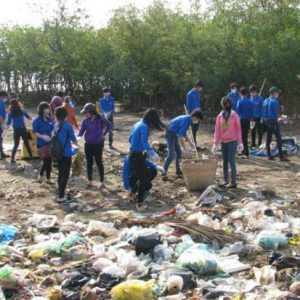
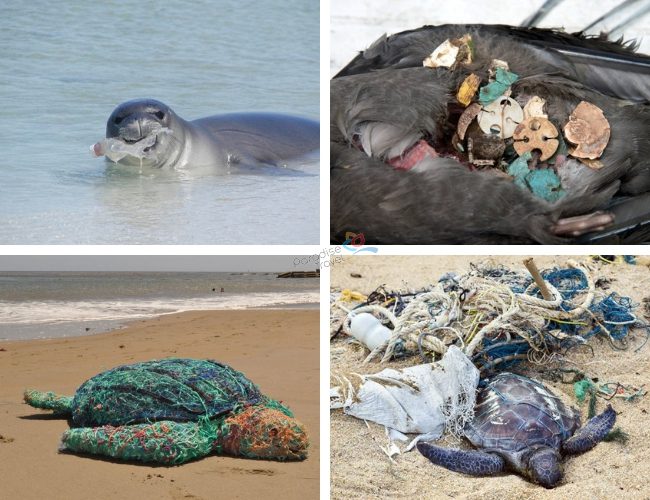





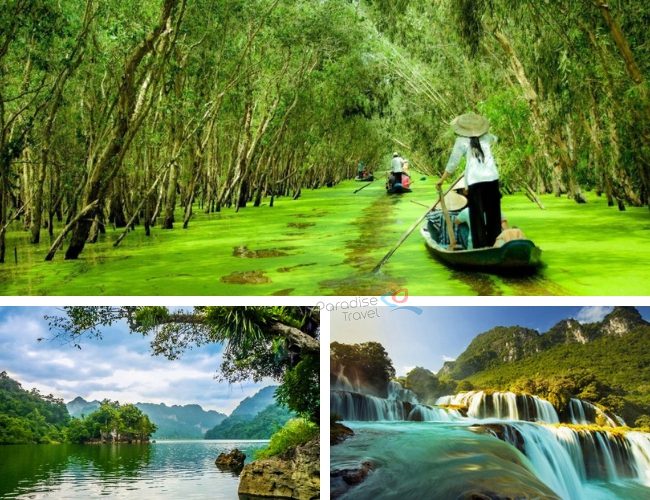







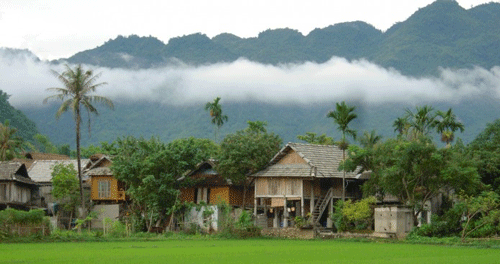


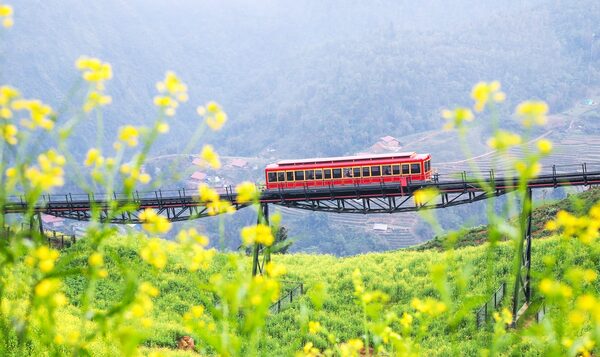

Great article, it’s time to stop using plastic products.
Dear Ms. Sarah Amato,
Thank you for your comment. You’re right, we should take action to protect our environment and keep our pollution-free planet.
Regards,
Chi NGUYEN
Where can I buy bamboo straws in Hanoi?
Dear Ms. Susan Bunn,
Thank you for your comment. You can find eco-friendly bamboo straws at:
– Go Eco Hanoi: 30 Tang Bat Ho Street
– Tap Hoa Xanh: No. 36, Lane 47 Doi Can Street
Regards,
Chi NGUYEN